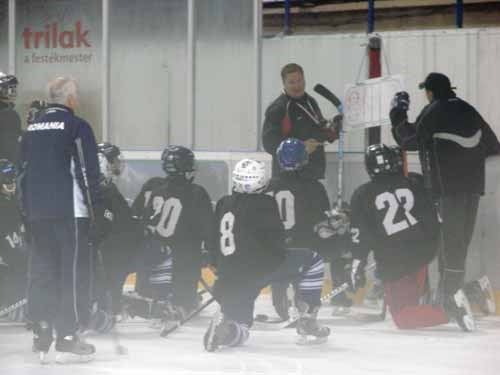A former Yorkton Terrier head coach spent part of his summer in Romania helping develop that country's young hockey players.
Wade Klippenstein, Terrier coach from December 1997 through July 2000, spent an intense week in early August working with both players and coaches in Romania.
"It was through some mutual friends," he said, pointing first to Tom Skinner, a former University of Brandon coach. "He's the national team coach in Romania."
Skinner had brought over other Canadians to help at camps in the past, and Klippenstein was recommended by current Moose Jaw Warriors assistant coach Mike Vandenberghe for a camp this summer focusing on the European country's National Under-18, and Under-16 teams.
Klippenstein, currently Assistant GM/Director of Player Personnel with the Western Hockey League's Prince George Cougars said the Romanian hockey program is going through a major re-tooling. He said if you look back to when the Soviet Union was in control, the country had a pretty successful program, having been one of the United States' Olympic opponents in 1980, the year the Americans won their surprise gold medal on home soil.
After the Soviet Union collapsed the Romanian program slipped, in large part because funds for hockey were cut dramatically, and in a poorer country the public does not have the resources to backfill the costs associated with the sport, said Klippenstein.
"If they don't win at the national level there's no interest (in funding hockey)," he said, adding the Romanian National Team won the Division II title last year, so move up to Division I, which has spurred interest. (Canada is among the Elite Division teams). "They want to stay in that second tier."
Romania will also be hosting the World Youth Games, and that too has leveraged some development dollars for hockey.
"They're putting a lot of money into their Under-16 team," said Klippenstein.
The improvements are where Skinner has been instrumental, offered Klippenstein.
"Tom (Skinner) has done a great job of getting the program back up and running again," he said, adding the young players at the camp were eager. "The kids were happy to learn. They wanted to get better."
In terms of competitiveness, Klippenstein said Romania's Under-18 team "would be competitive in the Saskatchewan (AAA) Midget League," but that leaves them well under the skill level of Canada's National team at that level.
At higher levels Romanian players are still a little shy of the top.
"I still don't think there's ever been a player from Romania in the NHL (National Hockey League)," said Klippenstein, adding they have made it to the American Hockey League.
"There national program has some very good athletes, but there's not a lot of depth there. There is just not a lot of kids that play hockey."
Klippenstein said in terms of sports soccer is likely the favoured team sport in Romania, and the country is known for its gymnastics program going back to Olympic star Nadia Comaneci who won three gold medals at the Summer Olympics held in Montreal in 1976. "She's almost royalty in their country," he said.
Klippenstein said he did go over with an eye to finding talent which his WHL team might be interested in.
"I went over with my WHL Hat on," he said, adding the league does allow some European players. " I did not see a player I thought could play at the WHL level." He said there are some athletes, but they are not big players, "and there's not the same amount of hours put in" to development.
And, there are differences in how the Romanians approach the game compared to Canadians, said Klippenstein.
"They like to stay in motion all the time," he said. "The kids didn't like to stop along the boards and wait."
Romanian players are also quiet on the ice, unlike Canadians who are constantly talking, calling for the puck when open, and setting up plays, said Klippenstein.
Klippenstein said there International Ice Hockey Federation pegs hockey enrollment at about 1,000, in a country with only eight indoor arenas.
In addition to limited numbers, Klippenstein said Romania faces other hurdles too.
"A lot of Romanian kids are of Hungarian descent," since part of the nation was once part of Hungary.
While not openly hostile, the two groups still speak their own language and tend to stick to themselves.
"It's a real interesting dynamic," said Klippenstein. " You can definitely feel the tension."
While Klippenstein spent most of the trip in the rink, with six on-ice sessions daily sandwiched around a classroom session with the players, and a coach's round table in the evening, he did get some sense of the country as well. He flew into Bucharest and then made a five hour trip north.
"It was only 200 kilometres but the trip took five hours. That tells you a lot about the shape of roads," he said.
The trip also showed the extremes within the country.
"A Mercedes would go zipping by you and around the next corner was a guy walking with a cow," said Klippenstein.
It's a country still in transition after "so many years of the government telling them what to do," he added. While they now elect their government it has left something of a vacuum. "They are happy the wall came down but now it's kind of 'what do I do?'"
As a result people while "very friendly" have limited financial resources, said Klippenstein, adding people there focus on not wasting anything. Even hotel lobby lights are off, working on a timer when people arrive.
"It made me aware of how much in North America we waste of how much we have that we don't need," he said. " They don't take anything for granted."
As for returning to Romania, Klippenstein said the program tends to recruit new faces each summer "so it could be a once in a lifetime thing, but if I had the opportunity I'd love to go back," he said.



